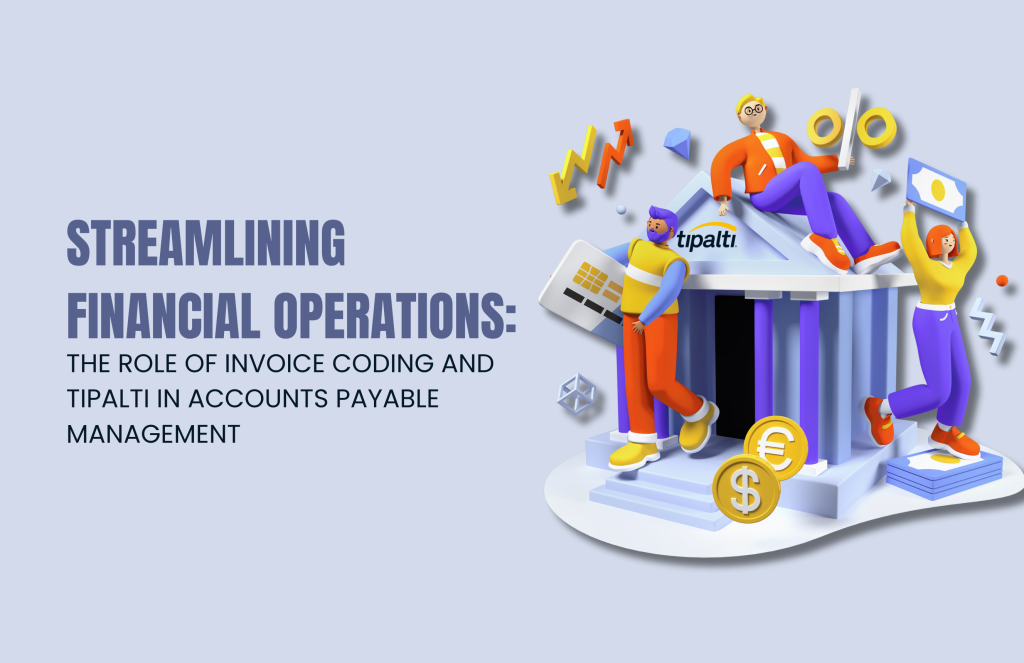Streamlining Financial Operations: The Role of Invoice Coding and Tipalti in Accounts Payable Management

Efficient financial management is the backbone of any successful organization, with accounts payable (AP) serving as a critical component. Within AP processes, invoice coding plays a pivotal role in ensuring that expenses are categorized correctly, enabling accurate financial reporting and effective budget management. However, as businesses grow and expand globally, managing accounts payable becomes increasingly complex.
This is where automation platforms like Tipalti step in, revolutionizing the way companies handle AP workflows. Tipalti’s end-to-end solutions simplify global payments, automate repetitive tasks, and ensure compliance with tax and regulatory requirements, all while improving operational efficiency. This introduction explores the significance of invoice coding and highlights how Tipalti transforms accounts payable into a streamlined, strategic function that supports business growth and financial stability.
What is Invoice Coding?
Invoice coding is a crucial process in financial and accounting management that involves assigning specific codes to invoices to classify and allocate expenses accurately within an organization’s accounting system. These codes enable streamlined financial tracking, compliance with regulatory standards, and efficient budgeting and reporting.
Key Components of Invoice Coding
- General Ledger (GL) Codes:
- These codes map expenses to specific categories in the chart of accounts.
- Examples include travel expenses, utilities, or office supplies.
- GL codes are vital for financial reporting and aligning expenses with the organization’s financial strategy.
- Cost Centers:
- Represent specific organizational units, departments, or teams responsible for the expense.
- Helps in monitoring and analyzing departmental spending.
- Example: A marketing expense might be coded to the “Marketing Department” cost center.
- Job or Project Codes:
- Used to track expenses tied to specific jobs or projects, common in industries like construction, consulting, and IT services.
- Ensures accurate project profitability analysis and supports client billing where applicable.
- Tax Codes:
- Indicate applicable taxes (e.g., VAT, GST, sales tax) associated with a transaction.
- Helps in ensuring compliance with tax regulations and accurate tax reporting.
What is Tipalti?
Tipalti is a comprehensive, cloud-based accounts payable (AP) automation and global payment platform designed to simplify and optimize the entire payables process. From invoice receipt and processing to global payments and tax compliance, Tipalti provides an end-to-end solution that reduces manual work, minimizes errors, and ensures timely, accurate financial operations.
Core Functions
- Global Payment Capabilities:
- Supports payments in over 190 countries and in 120+ currencies.
- Offers various payment methods, such as ACH, wire transfers, PayPal, and checks.
- Accounts Payable Automation:
- Digitizes invoice data using OCR and streamlines approval workflows.
- Automates payment scheduling and processing, reducing manual intervention.
- Supplier Management:
- Provides self-service portals for suppliers to manage their details and payment preferences.
- Ensures accurate information collection and reduces administrative overhead.
- Tax and Compliance Automation:
- Collects and validates tax forms (e.g., W-8, W-9, VAT IDs) to ensure compliance with regulations.
- Maintains audit trails to meet local and international standards.
- Data Integration:
- Integrates seamlessly with popular accounting and ERP systems like NetSuite, QuickBooks, and Xero.
- Enables real-time synchronization of AP data across systems.
- Reporting and Analytics:
- Provides dashboards and detailed reports to track AP metrics, payment statuses, and supplier performance.
Key Benefits of Implementing Tipalti
Businesses use Tipalti to simplify and optimize their payment and financial operations. Here’s how:
- Streamlined Global Payments:
Tipalti enables businesses to pay suppliers, contractors, and freelancers across the globe in over 190 countries and multiple currencies. This eliminates the complexity of managing diverse payment systems and ensures timely and accurate disbursements. - Tax Compliance:
The platform automates the collection, validation, and storage of tax forms such as W-8, W-9, and 1099. This reduces manual intervention, minimizes errors, and ensures businesses remain compliant with tax regulations. - Payment Automation:
By automating key processes such as payment approvals, scheduling, and reconciliation, Tipalti reduces manual workloads and administrative bottlenecks. This allows finance teams to focus on strategic initiatives rather than repetitive tasks. - Multiple Payment Methods:
Tipalti supports a variety of payment options, including ACH, wire transfers, PayPal, prepaid debit cards, and checks. This flexibility ensures that businesses can cater to the preferences of their payees. - Currency Management:
The platform manages currency conversion seamlessly, offering real-time foreign exchange rates. This helps businesses save on currency conversion fees and avoid financial discrepancies. - Reduced Errors:
Tipalti’s validation systems and automated workflows significantly reduce the risk of payment errors, missed deadlines, and compliance issues. An integrated audit trail ensures transparency and accountability. - Integration with Systems:
Tipalti integrates with leading ERP and accounting software such as NetSuite, QuickBooks, and Xero. This ensures smooth data synchronization and enhances overall financial management. - Regulatory Compliance:
The platform ensures compliance with global financial regulations, including OFAC, AML (Anti-Money Laundering), and GDPR, reducing legal and financial risks for businesses. - Improved Supplier Experience:
With self-service portals, suppliers can manage their payment details, track payment status, and resolve issues independently. This enhances supplier satisfaction and reduces support queries. - Scalability:
Tipalti is designed to scale with growing businesses. Whether a company is onboarding more suppliers or expanding into new regions, the platform adapts to increased complexity effortlessly.
Conclusion
The combination of organized invoice coding and Tipalti’s automated platform makes managing business payments much simpler and more efficient. By handling payments worldwide, following tax rules, and working smoothly with existing business systems, companies can turn their payment processes from a time-consuming task into a valuable business tool. This helps businesses save time, reduce mistakes, and grow more easily while keeping their finances accurate and compliant.
